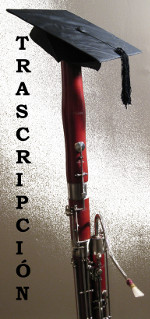Weissenborn Opus 8/2, Study #31for advanced bassoon students. Discussion of rapid breathing and sprints over large leaps. By Terry B. Ewell, Bassoon Digital Professor. Translated by Germán Martínez López. BDP#139. www.2reed.net.
Weissenborn Opus 8/2, Estudio Avanzado #31. Discusión sobre respiraciones rápidas y sprints a lo largo de grandes saltos. Por Terry B. Ewell, Profesor Digital de Fagot. Traducido por Germán Martínez López. BDP#139. Www.2reed.net.
TUTORIAL
1. Welcome, this is Terry Ewell. Weissenborn study #31 emphasizes fast and fluid fingering. I am not going to repeat practice methods presented earlier in studies such as 11, 14, 16, and 27, but I remind you to make ample use of rhythms and especially sprints.
Throughout this study I use my fast fingerings for Eb3 and Db4.
1.Bienvenidos, soy Terry Ewell. El estudio #31 de Weissenborn enfatiza el uso rápido y fluido de los dedos. No voy a repetir métodos de práctica presentados anteriormente en estudios como el 11, 14, 16 y 27, pero os recuerdo que hagáis uso de los ritmos y, especialmente, sprints.
A lo largo de este estudio utilizo mis digitaciones rápidas para Mib3 y Reb4.
2. Line 5 has some particularly difficult measures to play. It is very important that your sprints don’t stop at the measure line but go to the next note. Create segments that go to the next measure. The leaps are the most difficult part of the passage.
2.En la línea 5 encontramos algunos compases difíciles de tocar. Es muy importante que vuestros sprints no se detengan en la línea de compás, sino que vayan a la siguiente nota. Cread segmentos que vayan al siguiente compás. Los saltos son lo más difícil del pasaje.


3. This is another study where rapid breathing is necessary. In some ways it reminds me of the last movement of the Tansman Sonatine.
3.Este es otro estudio en donde es necesario respirar rápido. De alguna forma, me recuerda al último movimiento de la Sonatina de Tansman.
Example Tansman.

4. Both the Tansman Sonatine and this study require rapid breathing in the middle of quick notes. The quickest way to catch a breath is to breathe by dropping the jaw, not raising the head.
4.Tanto la Sonatina de Tansman como este estudio requieren respiraciones rápidas en medio de notas rápidas. La forma más rápida de respirar es bajando la mandíbula, no levantando la cabeza.
REFLECTION REFLEXIÓN
5. Be anxious for nothing, but in everything by prayer and supplication, with thanksgiving, let your requests be made know to God; (NKJV, Philippians 4:6)
5.Por nada estéis afanosos, sino sean conocidas vuestras peticiones delante de Dios en toda oración y ruego, con acción de gracias. (Filipenses 4: 6).
6. We live in a time of great anxiety. This is particularly the case for musicians.
6.Vivimos en un tiempo de gran ansiedad. Este es el caso particular de los músicos.
7. I worry about my performance ability, my reeds, or the demands of a difficult piece of music. I worry about living up to the expectations of others and particularly achieving my own demanding goals. Do you have these kinds of worries as well?
7.Me preocupo por mi habilidad para interpretar, mis cañas o las exigencias de un pasaje difícil en la música. Me preocupo por cumplir las expectativas de otros y en particular complir mis propias metas. ¿Vosotros también tenéis este tipo de preocupaciones?
8. This verse from the Bible has provided great comfort for me. From this verse I realize that I can approach God with my worries and anxieties. He will listen! I can express my worries to Him and He will provide relief.
8.Este verso de la Biblia me tranquiliza mucho. Gracias a este verso me doy cuenta de que puedo acercarme a Dios con mis preocupaciones y ansiedades. ¡El escuchará! Puedo expresarle mis preocupaciones a Él, y Él me aliviará.
